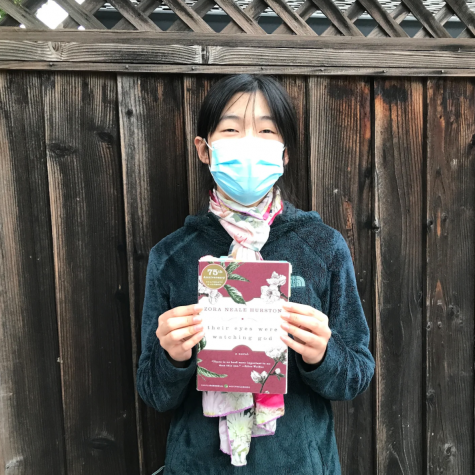Behind the Scenes: How the English Department Selects Books for the Curriculum
Delve into the process of choosing the books that Mitty students read in their English classes throughout the year.
October 18, 2021
Every book that a Mitty student opens, no matter at home or in class, represents new voices, ideas, and topics. Much thought goes into how these books are chosen for English courses. Whether it’s for summer reading or to study in class, each book read at Mitty is the result of an established process that seeks to guarantee impactful reads.
To begin the process, groups of teachers for each English course collaborate to determine the curriculum for the following year. They discuss how the books were received, fan out to discover new books, come together to decide what books to include in the next year’s curriculum, and bring them to the English department for approval. Concerning criteria, Ms. Beth Madia, the current English Department Chair, shared some questions that teachers consider: “What are the skills associated that we want the students to have? What book will help achieve those skills? Are there certain types of books that we want students to have exposure to?” With these questions in mind, teachers select books that not only suit the curriculum but also expose students to varying topics and issues.
Despite this, there are still books taught year after year. This is especially true in American Literature, where books like The Great Gatsby and Death of a Salesman have become staples. According to Mr. Mick VanValkenburg, an AP English Literature teacher, in American Literature there are “particular books that are so well known in the culture and in the literary canon… it’s necessary to continue teaching those.” While this limits how many fresh books can be taught, these books are still well-received by students. 
In addition to how the books are chosen, some might wonder how contemporary the literature is and why teachers want students to study newer books. Mr. VanValkenburg explained that the department does not have a specific process to find new, contemporary literature yet, but “…there’s a consciousness about trying to get new works in that will represent new voices and issues.” The books read in English are not studied purely for curriculum; they teach students about their country, present previously unrepresented voices, and help students learn more about themselves. Senior Elaine Ma believes that Zora Neale Hurston’s Their Eyes Were Watching God was “a more nuanced view about femininity in a world that promotes the historically more masculine aspects such as desire for power, ambition, and more. I would argue that this book empowers women to live in interdependence and promotes the mutual respect of both genders.”
Meanwhile, summer reading books are chosen slightly differently. Teachers look for engaging books that allow students to better understand their course. Books are chosen with certain things in mind: the enhancement these books provide to the course, and pertaining to AP students, how well they prepare students for the exam. Furthermore, the purpose of summer reading varies by grade level. While underclassmen often have a unit in their curriculum about summer reading, upperclassmen, on the other hand, are given an appealing book that does not relate to the course itself. As Mr. VanValkenburg explained, “You’re looking for books that you think will engage students, entertain students—very plot-driven books.”
The goal, then, is to not only teach students valuable skills, but introduce them to different issues and help them learn more about themselves. Though a book can be read in a day, the lifelong lessons and information students glean from it is all a product of the work the English department puts in to offer us these new adventures.


